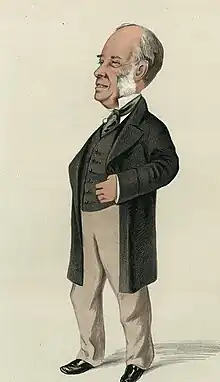
Sir Gabriel Goldney, 1st Baronet (25 July 1813 – 8 May 1900)[1] was a Conservative politician who sat in the House of Commons from 1865 to 1885. He was created a baronet in May 1880.
Ancestry and early life
The Goldney family, from Bristol, became clothiers in Chippenham in the sixteenth century and were long afterwards associated with Wiltshire, and particularly the town.[2] An ancestor, Henry Goldney, had also been a member of parliament for Chippenham and was in 1553 appointed the first "Bayliff" of Chippenham.[3] A 17th-century ancestor, also named Gabriel, left bequests in his will to provide "greatcoats for six poor inhabitants".[3]
Goldney was born on 25 July and baptised at Chippenham on 3 December 1813.[4] His father was Harry Goldney (1774–1852) and his mother Elizabeth (née Reade, c. 1789–1863).[5] He was educated at Christ's Hospital (of which he later became a governor) from 1820 to 1828.[6]
Goldney married Mary Anne Alexander in Corsham on 16 September 1839,[4] and they had four children: Mary Catherine Goldney (14 October 1841 – 4 August 1854), Gabriel Prior Goldney (b. 4 August 1843), Frederick Hastings Goldney (b. 26 May 1845), and John Tankerville Goldney (b. 15 June 1846).[7]
Career
Goldney became a landowner, financier and banker. In 1854 he bought Sheldon Manor[8] and in 1856, land in Hilmarton.[9] His investments extended outside Wiltshire to Camberley in Surrey, as in 1860 he advanced money to develop a silk farm at Heatherside; however, the venture failed, Goldney foreclosed on his investment and took possession of the land, part of which later became Prior Park, Camberley, the residence of his two elder sons.[10]
In 1863 he bought land at Bradenstoke Abbey from Frederick Methuen, 2nd Baron Methuen,[11] and the following year, bought Stanley Abbey from John Bayntun Starkey.[12] By 1888 he also owned land at Monks Park, Corsham, which he leased for quarrying.[13]
He was first elected to parliament as Conservative Member of Parliament for Chippenham, Wiltshire, England on 11 July 1865 and made his maiden speech on 20 April 1866.[14] By this time, he was a Director of the North Wilts Bank.[15] In this capacity, he was persuaded by railway engineer Roland Brotherhood to relax the bank's conditions on his overdraft in return for help in getting Goldney re-elected in the forthcoming election; Goldney, having been re-elected, then advised the bank that the conditions could be relaxed. However, shortly after this, in 1869, the bank changed its mind, and Brotherhood's enterprise failed;[15] Brotherhood blamed Goldney for this.[16] Goldney was appointed a Deputy Lieutenant of Wiltshire on 22 February 1869.[17][18]
The position of Bailiff of Chippenham passed down to Goldney; he was also a Freemason, holding the office of Grand Warden of England.[3] He was created Baronet Goldney of Beechfield in the parish of Corsham, and Bradenstoke Abbey in the parish of Lyneham on 30 April 1880.[19]
He died at Eaton Place, Belgravia, London on 8 May 1900,[20] and the baronetcy passed to his first son, Gabriel Prior Goldney.
Legacy
Goldney is commemorated in stained-glass windows of Chippenham parish church,[21] The Foundling Hospital, London[22] and in the name of Goldney Avenue, Chippenham.[23]
References
- ↑ "Sir Gabriel Goldney". Parliamentary Debates (Hansard). Retrieved 5 March 2009.
- ↑ "Wiltshire Community History Get Community Information". Wiltshire Council. Retrieved 9 March 2009.
- 1 2 3 Anonymous (2003). Representative British Freemasons. Kessinger Publishing. ISBN 978-0-7661-3589-5.
- 1 2 "Sir Gabriel GOLDNEY 1813-1900". genealogy.links.org.
- ↑ "Harry GOLDNEY 1774-1852". genealogy.links.org.
- ↑ "Christ's Hospital Old Blues Association". Retrieved 5 December 2009.
- ↑ Howard, Joseph Jackson; Frederick Arthur Crisp (1896). Visitation of England and Wales (1997 Reprint). Bowie, MD: Heritage Books, Inc. p. 59. ISBN 0-7884-0622-1. Retrieved 4 December 2009.
- ↑ "Parks and Gardens UK". Parks and Gardens data services Ltd, Archaeology Department, University of York. Archived from the original on 15 February 2012. Retrieved 5 March 2009.
- ↑ "Parishes–Hilmarton". British History Online. Institute of Historical Research and Parliamentary History Trust. Retrieved 5 March 2009.
- ↑ "Surrey History: Exploring Surrey's Past – Archive Record". www.exploringsurreyspast.org.uk. Retrieved 7 December 2009.
- ↑ "Parishes–Lyneham". British History Online. Institute of Historical Research and Parliamentary History Trust. Retrieved 5 March 2009.
- ↑ "Bayntun History: John Bayntun Starky 1834". bayntun-history.com. Retrieved 6 March 2009.
- ↑ "SUMSION Quarry transactions mentions Lankesheer". freepages.genealogy.rootsweb.ancestry.com. Retrieved 6 March 2009.
- ↑ "Sir Gabriel Goldney profile". Parliamentary Debates (Hansard). Retrieved 5 March 2009.
- 1 2 "Chippenham Town Council – Museum & Heritage Centre – Characters – Rowland Brotherhood". www.chippenham.gov.uk. Archived from the original on 14 November 2010. Retrieved 14 October 2010.
- ↑ "A Centenary Note – R. Brotherhood". Industrial Railway Record. Industrial Railway Society. Retrieved 6 March 2009.
- ↑ "No. 23483". The London Gazette. 30 March 1869. p. 2006.
- ↑ "No. 24829". The London Gazette. 2 April 1880. p. 2358.
- ↑ "No. 24840". The London Gazette. 30 April 1880. p. 2786.
- ↑ "Full text of "Visitation of England and Wales"". 1893. Retrieved 4 December 2009.
- ↑ "St Mary's in St Andrews". Bradenstoke Bugle. Retrieved 6 March 2009.
- ↑ "The Foundling Hospital". British History Online. Institute of Historical Research and Parliamentary History Trust. Retrieved 6 March 2009.
- ↑ 51°27′37″N 2°07′29″W / 51.4602°N 2.1246°W
External links
- Hansard 1803–2005: contributions in Parliament by Sir Gabriel Goldney
- Goldney papers, University of Bristol Library Special Collections